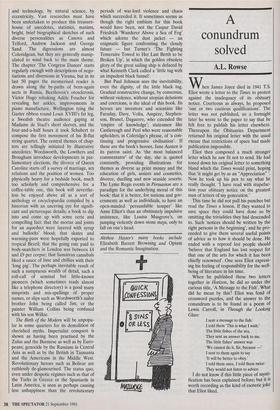A conundrum solved
A.L. Rowse
When James Joyce died in 1941 T.S. Eliot wrote a letter to the Times to protest against the inadequacy of its obituary notice. Courteous as always, he proposed `one or two cautious qualifications'. The letter was not published, so a fortnight later he wrote to the paper to say that he felt free to publish his letter elsewhere. Thereupon the Obituaries Department returned his original letter with the usual excuse that restrictions of space had made publication impossible.
Eliot then composed a much stronger letter which he saw fit not to send. He had toned down his original letter to something bland which the Times would print, hoping that 'it might get by as an "Appreciation"'. Now he took up his pen to say what he really thought. 'I have read with stupefac- tion your obituary notice on the greatest man of letters of my generation.'
This time he did not pull his punches but read the Times a lesson. If they wanted to save space they could have done so by omitting the trivialities they had descended to. Such `notices should be written by the right persons in the beginning', and he pro- ceeded to give them several useful points of advice as to how it should be done. He ended with a reproof lest people should `believe that England has lost respect for that one of the arts for which it has been chiefly renowned'. One sees Eliot express- ing his feeling of responsibility for the well- being of literature in his time.
When he published these two letters together in Horizon, he did so under the curious title, 'A Message to the Fish'. What did he mean by this? Eliot was fond of crossword puzzles, and the answer to the conundrum is to be found in a poem of Lewis Carroll, in Through the Looking Glass:
I sent a message to the fish: I told them 'This is what I wish.'
The little fishes of the sea, They sent an answer back to me.
The little fishes' answer was `We cannot do it, Sir, because
I sent to them again to say
`It will be better to obey.'
I told them once, I told them twice: They would not listen to advice.
1 do not know if this little piece of mysti- fication has been explained before; but it is worth recording as the kind of esoteric joke that Eliot liked.


























































 Previous page
Previous page